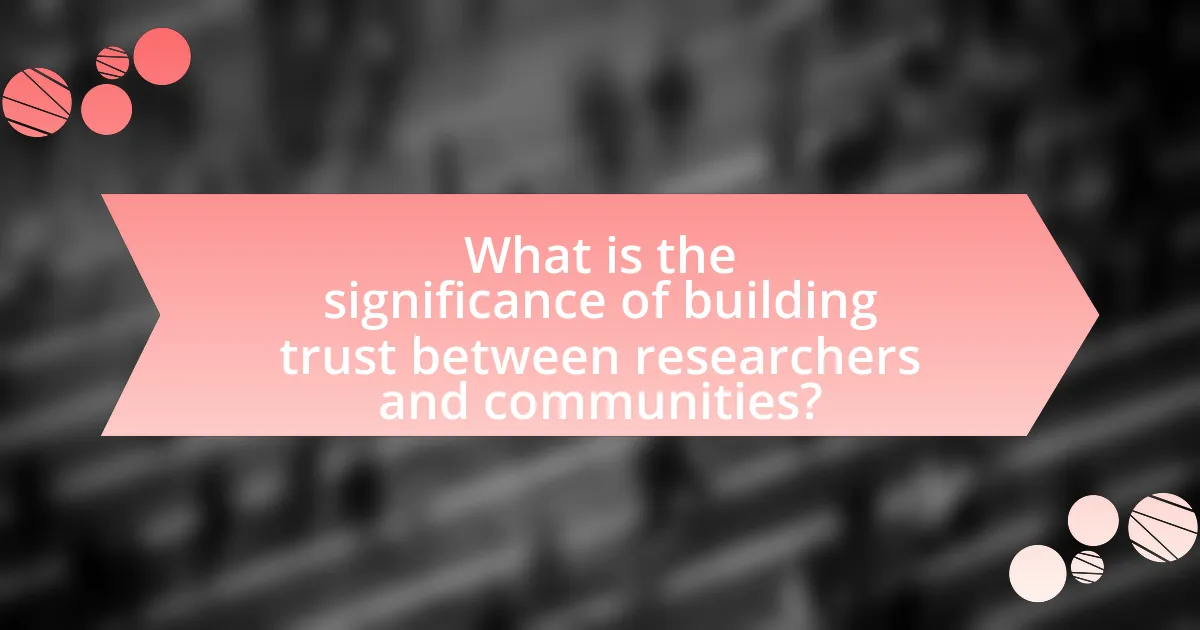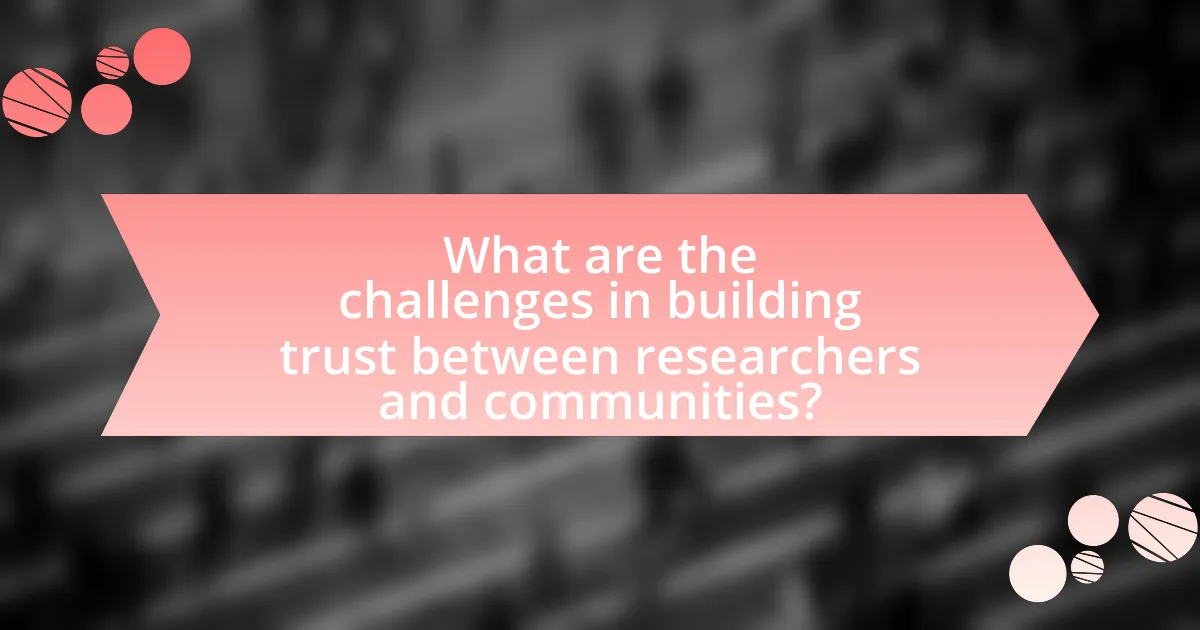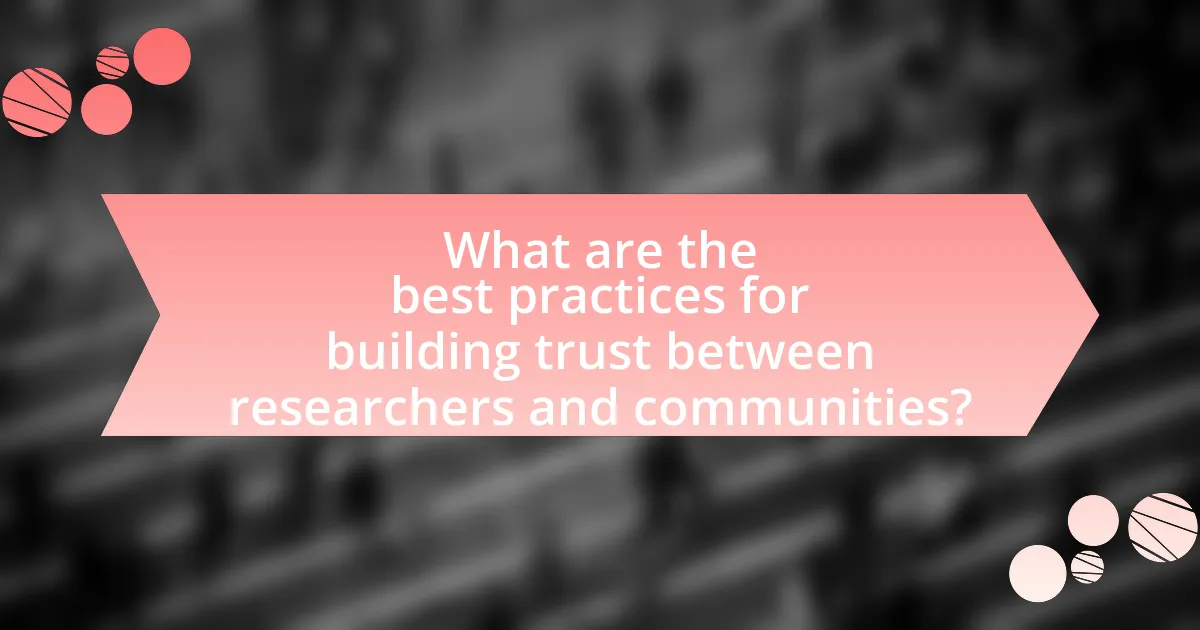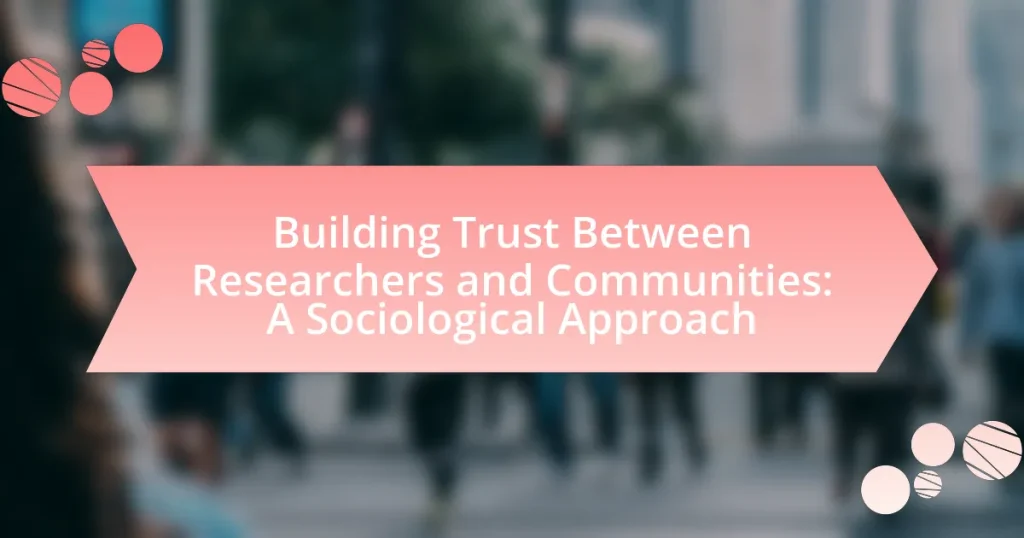Building trust between researchers and communities is essential for fostering collaboration, enhancing research relevance, and improving the implementation of findings. This article explores the significance of trust in research outcomes, highlighting key factors such as transparency, communication, and mutual respect that influence trust dynamics. It examines the role of community engagement in enhancing trust, the impact of sociological approaches on understanding trust dynamics, and the challenges researchers face in building trust, including historical mistrust and communication barriers. Additionally, it outlines best practices for establishing and maintaining trust, emphasizing the importance of active engagement, transparency, and feedback mechanisms in sustaining long-term relationships between researchers and communities.

What is the significance of building trust between researchers and communities?
Building trust between researchers and communities is significant because it fosters collaboration, enhances the relevance of research, and improves the implementation of findings. Trust encourages community members to share their insights and concerns, leading to more accurate data collection and a deeper understanding of local issues. For instance, a study published in the Journal of Community Engagement and Scholarship highlights that when researchers engage with communities transparently, the quality of research outcomes improves, as community input directly informs the research process. This collaborative approach not only increases the validity of the research but also ensures that the findings are more likely to be accepted and utilized by the community, ultimately benefiting both parties.
How does trust impact research outcomes?
Trust significantly impacts research outcomes by enhancing collaboration, data sharing, and participant engagement. When researchers establish trust with communities, they are more likely to receive accurate data and honest feedback, which leads to more reliable results. For instance, a study published in the Journal of Community Psychology found that trust between researchers and community members increased participation rates by 40%, thereby improving the quality of the research findings. This relationship underscores the importance of trust in fostering an environment conducive to effective research practices and outcomes.
What are the key factors that influence trust in research settings?
Key factors that influence trust in research settings include transparency, communication, and mutual respect. Transparency involves openly sharing research goals, methods, and findings, which fosters credibility. Effective communication ensures that all stakeholders understand the research process and its implications, reducing misunderstandings. Mutual respect between researchers and communities builds rapport and encourages collaboration, as evidenced by studies showing that participatory research approaches enhance trust and engagement. For instance, a study by Israel et al. (1998) highlights that community involvement in research design and implementation significantly increases trust levels among participants.
How does community engagement enhance trust?
Community engagement enhances trust by fostering open communication and collaboration between researchers and community members. This interaction allows for the sharing of knowledge, concerns, and expectations, which builds mutual understanding. Research indicates that when communities are actively involved in the research process, they are more likely to perceive researchers as credible and trustworthy. For instance, a study published in the Journal of Community Psychology found that participatory research methods significantly increased community members’ trust in researchers, as they felt their voices were heard and valued. This trust is crucial for successful partnerships and effective research outcomes.
Why is a sociological approach important in this context?
A sociological approach is important in the context of building trust between researchers and communities because it facilitates understanding of social dynamics and cultural contexts. This understanding allows researchers to engage effectively with communities, fostering collaboration and mutual respect. For instance, sociological theories highlight the significance of social capital, which can enhance trust and cooperation between researchers and community members. By applying these theories, researchers can identify community needs and values, leading to more relevant and accepted research outcomes.
What sociological theories can be applied to understand trust dynamics?
Sociological theories that can be applied to understand trust dynamics include Social Exchange Theory, which posits that trust is built through reciprocal interactions and perceived benefits; and the Theory of Social Capital, which emphasizes the role of social networks and relationships in fostering trust. Social Exchange Theory suggests that individuals weigh the costs and benefits of their interactions, leading to trust when perceived benefits outweigh costs. The Theory of Social Capital highlights how trust emerges from shared norms and values within communities, facilitating cooperation and collaboration. These theories are supported by empirical research indicating that trust is significantly influenced by social interactions and community engagement, as seen in studies on community resilience and cooperation.
How do social structures affect researcher-community relationships?
Social structures significantly influence researcher-community relationships by shaping the dynamics of trust, communication, and collaboration. For instance, hierarchical social structures can create barriers to engagement, as communities may feel marginalized or distrustful of researchers perceived as outsiders. Conversely, egalitarian social structures foster open dialogue and mutual respect, enhancing collaboration. Research by the American Sociological Association indicates that communities with strong social networks are more likely to engage positively with researchers, leading to more effective partnerships and outcomes. This demonstrates that the nature of social structures directly impacts the quality and effectiveness of interactions between researchers and communities.

What are the challenges in building trust between researchers and communities?
The challenges in building trust between researchers and communities include historical mistrust, differing priorities, and communication barriers. Historical mistrust arises from past exploitative research practices, leading communities to be skeptical of researchers’ intentions. Differing priorities often result from researchers focusing on academic goals while communities prioritize immediate social needs, creating a disconnect. Communication barriers, including jargon and lack of transparency, hinder effective dialogue, making it difficult for communities to engage meaningfully with researchers. These factors collectively impede the establishment of a trusting relationship essential for collaborative research efforts.
What barriers exist that hinder trust development?
Barriers that hinder trust development include lack of transparency, communication breakdown, and historical mistrust. Lack of transparency occurs when researchers do not openly share their methods, intentions, or findings, leading to skepticism from communities. Communication breakdown arises when researchers fail to engage effectively with community members, resulting in misunderstandings and a sense of alienation. Historical mistrust is rooted in past negative experiences between researchers and communities, often due to exploitation or misrepresentation, which creates a lingering wariness that complicates new relationships. These barriers collectively impede the establishment of trust, as evidenced by studies indicating that trust is significantly influenced by prior interactions and the perceived integrity of the parties involved.
How do historical contexts influence current trust levels?
Historical contexts significantly influence current trust levels by shaping perceptions and experiences within communities. For instance, communities that have faced historical injustices, such as systemic discrimination or exploitation, often exhibit lower trust in institutions and researchers due to past betrayals. A study by the Pew Research Center in 2021 found that 61% of Black Americans reported a lack of trust in medical institutions, rooted in historical abuses like the Tuskegee Syphilis Study. This historical context creates a legacy of skepticism that affects present-day interactions and trust-building efforts.
What role does communication play in overcoming these barriers?
Communication is essential in overcoming barriers between researchers and communities by facilitating understanding and collaboration. Effective communication allows researchers to convey their intentions, methodologies, and findings clearly, which helps to build trust and transparency. For instance, when researchers actively engage with community members through dialogue, they can address concerns, clarify misconceptions, and incorporate local knowledge into their work. This two-way communication fosters a sense of ownership among community members, making them more likely to support and participate in research initiatives. Studies have shown that projects with strong communication strategies report higher levels of community involvement and satisfaction, demonstrating that communication is a critical tool for bridging gaps and enhancing cooperative relationships.
How can researchers effectively address these challenges?
Researchers can effectively address challenges in building trust with communities by engaging in transparent communication and fostering collaborative partnerships. Transparent communication involves sharing research goals, methodologies, and findings openly with community members, which helps demystify the research process and builds credibility. Collaborative partnerships can be established by involving community stakeholders in the research design and implementation phases, ensuring that their perspectives and needs are prioritized. For instance, studies have shown that participatory research approaches, where community members actively contribute to the research process, lead to increased trust and better outcomes (Cornwall & Jewkes, 1995). By prioritizing these strategies, researchers can create a more inclusive environment that enhances trust and cooperation.
What strategies can be employed to foster trust?
To foster trust, researchers can employ strategies such as transparent communication, active engagement, and consistent follow-through on commitments. Transparent communication involves sharing research goals, methodologies, and findings openly with the community, which builds credibility and reduces misunderstandings. Active engagement means involving community members in the research process, allowing them to contribute their insights and concerns, thereby creating a sense of ownership and collaboration. Consistent follow-through on commitments ensures that researchers deliver on promises made to the community, reinforcing reliability and accountability. These strategies are supported by studies indicating that trust is significantly enhanced when stakeholders feel informed, involved, and respected in the research process.
How can researchers adapt their methods to be more community-focused?
Researchers can adapt their methods to be more community-focused by actively involving community members in the research process, ensuring their perspectives and needs are prioritized. This can be achieved through participatory research approaches, where community members contribute to the design, implementation, and analysis of research projects. For instance, studies have shown that involving communities in the research process increases the relevance and applicability of findings, as seen in the Community-Based Participatory Research (CBPR) model, which emphasizes collaboration between researchers and community stakeholders. By fostering open communication and building relationships based on trust, researchers can enhance the effectiveness and impact of their work within the community.

What are the best practices for building trust between researchers and communities?
The best practices for building trust between researchers and communities include active engagement, transparency, and mutual respect. Active engagement involves researchers involving community members in the research process, ensuring their voices are heard and valued. Transparency requires researchers to openly share their goals, methods, and findings, fostering an environment of honesty. Mutual respect is essential, as it acknowledges the knowledge and experiences of community members, creating a collaborative atmosphere. These practices are supported by studies indicating that trust is significantly enhanced when communities feel included and informed throughout the research process. For instance, a study by the National Institutes of Health emphasizes that community involvement leads to more effective and trusted research outcomes.
What role does transparency play in trust-building?
Transparency is essential in trust-building as it fosters open communication and accountability. When researchers share their methodologies, findings, and potential conflicts of interest, they create an environment where communities feel informed and valued. This openness reduces skepticism and enhances credibility, as evidenced by studies showing that transparent practices lead to higher levels of trust in research outcomes. For instance, a 2019 study published in the Journal of Trust Research found that transparency significantly correlates with increased trust levels among community stakeholders in research initiatives.
How can researchers ensure transparency in their work?
Researchers can ensure transparency in their work by openly sharing their methodologies, data, and findings with the public and the scientific community. This practice includes publishing detailed research protocols, making raw data accessible through repositories, and providing clear explanations of the research process and results. For instance, the Open Science movement advocates for these principles, emphasizing that transparency enhances reproducibility and trust in research outcomes. Studies have shown that when researchers disclose their methods and data, it fosters collaboration and accountability, ultimately benefiting both the scientific community and society at large.
What are the benefits of involving community members in the research process?
Involving community members in the research process enhances the relevance and applicability of the findings. When researchers collaborate with community members, they gain insights into local needs, values, and contexts, which leads to more tailored and effective solutions. A study published in the American Journal of Public Health highlights that community engagement in research increases participant recruitment and retention rates, ultimately resulting in higher quality data. Additionally, involving community members fosters trust and transparency, which can lead to sustained partnerships and improved health outcomes, as evidenced by the Community-Based Participatory Research model that emphasizes shared decision-making and co-learning.
How can researchers maintain long-term relationships with communities?
Researchers can maintain long-term relationships with communities by engaging in continuous dialogue and collaboration. This involves actively listening to community needs, incorporating their feedback into research processes, and ensuring that the community benefits from the research outcomes. For instance, studies have shown that participatory research methods, which involve community members in the research design and implementation, lead to stronger trust and sustained partnerships. A notable example is the Community-Based Participatory Research (CBPR) approach, which has been effective in various health-related studies, demonstrating that when communities are involved, the relationships are more likely to endure over time.
What follow-up practices are essential for sustaining trust?
Essential follow-up practices for sustaining trust include consistent communication, transparency in sharing results, and actively seeking feedback from stakeholders. Consistent communication ensures that all parties remain informed about ongoing developments and any changes in research direction. Transparency in sharing results fosters an environment of openness, allowing communities to understand the implications of research findings. Actively seeking feedback demonstrates respect for community input and encourages collaborative engagement, which reinforces trust. Research indicates that these practices are critical in maintaining long-term relationships between researchers and communities, as they create a foundation of reliability and mutual respect.
How can feedback mechanisms enhance ongoing trust?
Feedback mechanisms enhance ongoing trust by facilitating open communication and demonstrating responsiveness to concerns. When researchers actively solicit and incorporate feedback from communities, they show that they value community input, which fosters a sense of partnership. Studies indicate that consistent feedback loops can lead to increased transparency and accountability, essential components of trust-building. For instance, research published in the Journal of Community Engagement and Scholarship highlights that communities engaged in feedback processes report higher levels of trust in researchers, as they feel their voices are heard and respected.
What practical steps can researchers take to build trust effectively?
Researchers can build trust effectively by engaging in transparent communication and actively involving community members in the research process. Transparency fosters openness, allowing researchers to share their methodologies, findings, and intentions clearly, which helps demystify the research process. Actively involving community members, such as through participatory research methods, ensures that their voices are heard and valued, leading to a sense of ownership and collaboration. Studies have shown that when communities are engaged in the research process, trust increases significantly, as evidenced by the work of researchers like Israel et al. (1998) in “Community-Based Participatory Research: A Partnership Approach for Public Health.” This approach not only enhances trust but also improves the relevance and applicability of research outcomes to the community’s needs.
